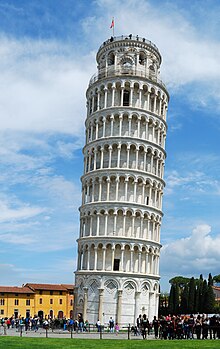Leaning Tower of Pisa
| Leaning Tower of Pisa | |
|---|---|
 | |
| Religion | |
| Affiliation | Roman Catholic |
| District | Tuscany |
| Province | Pisa |
| Ecclesiastical or organizational status | Open |
| Location | |
| Location | |
| Geographic coordinates | 43°43′24″N 10°23′39″E / 43.72333°N 10.39417°E |
| Architecture | |
| Architect(s) | Bonanno Pisano |
| Groundbreaking | 1173 |
| Completed | 1372 |
| Specifications | |
| Height (max) | 55.86 metres (183.3 ft) |
| Materials | Marble, stone |
| Website | |
| http://www.opapisa.it/en/home-page.html | |
The Leaning Tower of Pisa is a building in Pisa, Italy. It is a bell tower. It is famous for its nearly four-degree lean. In 1990 the tower was leaning at 5.5 degrees and increasing. After that, much restoration work has been done to stop it from falling over completely. There was scaffolding all around the tower for 20 years. On 26 April 2011, the last bit of scaffolding was removed so that the tower can be seen properly again.[1]
The height of the tower is about 56 metres (184 ft) from the ground. Its weight is about 14,500 tons. The tower has 294 steps.
The tower construction began in 1173.[2] When the second floor was built in 1178, the tower started to lean. This was because it had a small three-meter foundation in soft soil. The design of this tower was bad from the beginning. Construction was stopped for almost 100 years because the people of Pisa were often at war with Genoa, Lucca and Florence.
There is an old story that Galileo Galilei used the Tower for a physics experiment.
Earthquake survival
[change | change source]The Leaning Tower of Pisa has survived four earthquakess since 1280. That is why in the 1990s the tower was closed to the public.
Photos of the tower
[change | change source]


Related pages
[change | change source]References
[change | change source]- ↑ "Standing corrected" in The Independent, 27 April 2011 p.31
- ↑ "Architecture of Leaning Tower of Pisa". Retrieved 22 August 2023.
